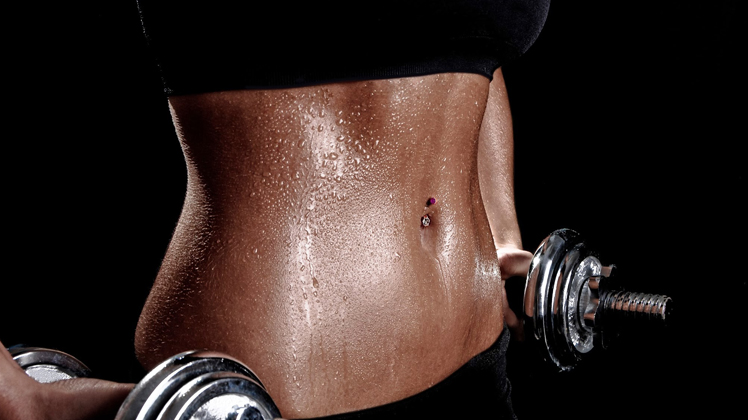
To many, sweating might be a total (or at least partial) mystery. You might have heard that sweating is your body’s way of cooling off . . . but then why does it feel like the more you sweat, the hotter you get? In general, sweat is a sticky subject because there are so many misconceptions, myths, and old wives’ tales that surround it.
For instance, you may hear (and probably believe) many of these ideas: sweat is how we eject toxins from your body, how you can lose weight, and the fatter you are, the easier you’ll sweat.
Your Body’s Natural Cooling System
None of these ideas are true, however. Sweat is your body’s natural cooling system, but that’s it. Because it’s made up of mostly water and a few salts, sweat isn’t the best way to get rid of any toxins in your body. Lose too much sweat though, and you will lose more salts than you should. This is when you start to feel dehydrated, and regaining those lost fluids and salts by drinking sports drinks or other sources like coconut water is essential. Especially with a summer like the one we’re having this year!
It’s easy to believe that continuously wiping the sweat off your brow and forehead would cool you off faster since you are getting rid of that icky, hot sweat. But the opposite is true. The body actually cools itself by opening the pores on the skin and pushing water and salt through them. Once the sweat is on your skin, it evaporates into the air, and this transfer of heat from the skin to the air is what cools you off. That’s why you cool off faster and easier if you leave the sweat alone . . . as yucky as it seems. There’s a catch, though.
Dry Air is Essential
This natural cooling system relies heavily on dry air to function properly, because dry air can carry enough moisture to effectively cool you off. When humidity levels are higher, though, the air is already saturated with water and the amount of sweat that evaporates from your skin is significantly reduced. That’s why it feels hotter on humid days, and why you can easily tolerate 110 degrees of dry heat in the Arizona sun while you struggle to breathe in a muggy tropical environment that’s only 80 degrees but with high humidity.
It’s important that you allow your body to sweat and cool off naturally, because if not, your body will keep storing all of that heat inside. Eventually, this buildup of heat could lead to the heat illnesses we are familiar with, like heat stroke or heat cramps. When these illnesses begin to take place, it’s a sign that your body is basically cooking your insides and you need to cool down – fast.
Other Causes of Sweating
The heat’s not the only thing that makes you sweat, as many teens afflicted with their first puppy love will tell you. Being nervous or scared can increase the amount of activity taking place in your sympathetic nervous system, which controls your sweating. You can tell when it’s your sympathetic system making you sweat instead of the heat because it will feel like a cold sweat. If you sweat excessively in the mildest of heat and continue to sweat even when not nervous or scared, you may have what’s called hyperhidrosis, which is excessive sweating. Oftentimes, hyperhidrosis can be treated with medication.
Sweat Comfortably
Even though sweating may be uncomfortable, there are always options to help you sweat and cool off easier. If you like to work out, maybe try joining an indoor gym that provides air conditioning as aneffort to beat the heat. . . or at the very least a gym that provides adequate air circulation. Anywhere you go, wear light, loose fitting clothing that allows your body to breathe. And again, don’t keep wiping the sweat off, as gross as it may seem.
If you’re an athlete, it may be worth the investment to purchase special clothing that removes, or “wicks” sweat off your body. Where cotton fabrics tend to retain the moisture and end up feeling heavy and soggy, wicking fabrics pull the sweat away from your skin and push it outside of the fabric, where it can evaporate.
Your body has devised a great way of cooling off, and by learning a little more about how sweat works and why it’s important, you might have an easier time dealing with the sticky shirts and sweaty noses!
Cited Sources
“Why Do We Sweat?” WiseGeek.com. WiseGEEK, n.d. Web. 18 July 2012. #
“Sweating.” Sweating.co.uk. The Whitely Clinic, n.d. Web. 18 July 2012.
“Why Do We Sweat More in High Humidity?” MIT.edu. Massachusetts Institute of Technology, n.d. Web. 18 July 2012.
Freudenrich, PhD, Craig. “All About Sweat.” Health.HowStuffWorks.com. Discovery Fit & Health, n.d. Web. 18 July 2012.
#InsidersHealth

A new study suggests that a widely used sugar substitute found in diet sodas, chewing gum, and low-sugar yogurt may elevate insulin levels. This could increase the long-term risk of heart disease. “Artificial sweeteners have infiltrated nearly all types of food, making it crucial to understand their long-term health effects,” said Yihai Cao, senior author […]

Diet Coke has long been a fan-favorite among soda lovers who want a fizzy, guilt-free alternative to traditional soft drinks. While its zero-calorie, zero-sugar label makes it seem like a healthier option, the reality is far more concerning. Despite its undeniable popularity, Diet Coke’s nutritional profile has raised red flags among health experts for years. […]

New study shows that embracing an anti-inflammatory, plant-forward diet can support cognitive function and help reduce the risk of dementia. What You Eat Shapes Your Brain The food you eat doesn’t just impact your body—it also affects your brain. Research suggests that eating an anti-inflammatory, plant-based diet can help improve memory, focus, and overall brain […]